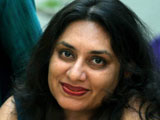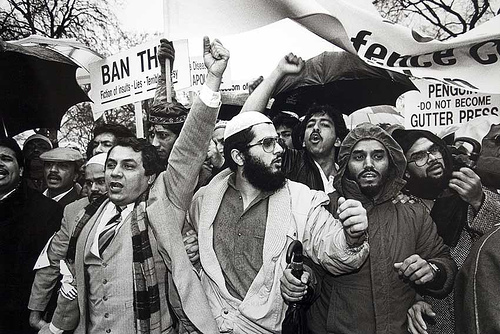On Libricide
The perils of writing under blasphemy laws
I was a senior in an American school in Karachi when Salman Rushdie published his infamous novel The Satanic Verses and the Muslim world erupted in protest. The streets of Pakistan and the halls of our high school echoed with anger against Rushdie, whom we knew had committed blasphemy by writing in a derogatory way about the Prophet Muhammad and his wives, even though the author claimed his characters were not based on the religious figures we revered so highly.

- Pakistan is a country of contradictions – full of promise for growth, modernity and progress, yet shrouded by political, social and cultural issues that undermine its quest for identity and integrity. My bi-monthly column “Pakistan Unveiled” presents stories that showcase the Pakistani struggle for freedom of expression, an end to censorship, and a more open and balanced society.

- Bina Shah is a Karachi-based journalist and fiction writer and has taught writing at the university level. She is the author of four novels and two collections of short stories. She is a columnist for two major English-language newspapers in Pakistan, The Dawn and The Express Tribune, and she has contributed to international newspapers including The Independent, The Guardian, and The International Herald Tribune. She is an alumnus of the International Writers Workshop (IWP 2011).
My high school English teacher tried to debate with us about whether Rushdie merited a death sentence for his actions. The American and European students in my class were indifferent, but we Muslim Pakistanis blazed with indignation, even though none of us had read the book (it was banned). Mr. Newman turned to me, his favorite student, and asked me what I thought.
“He’s hurt our feelings,” I said, filled with certainty and the desire to be united with my classmates in our righteous anger. “He should die.”
My English teacher’s eyes filled with tears, but I didn’t understand why.
Now that I’m no longer sixteen, and a published author, as well as a practicing Muslim, I understand what a dilemma the concept of blasphemy holds for writers. In Pakistan, where I live, the blasphemy law has caused grief for hundreds of Pakistanis. However it doesn’t affect only those accused of blasphemy, who are lucky if they receive a trial in a court of law rather than being killed by an angry mob, it also affects the people related to the accused, or living in the same community.
In the latest instance of blasphemy-gone-wrong, a small Christian girl named Rimsha Masih has been accused of burning pages of a reader used to teach children how to read the Quran. She has been locked in jail, despite being a minor and reportedly suffering from Down syndrome, while the Christians of her village have fled in fear for their lives.
As a writer in Pakistan, I worry about writing things that will offend others’ religious sensibilities. Self-censorship only goes so far: A writer in creative mode can’t hold back when words and ideas arrive at full force. I have to go over my work again and again and show it to fellow writers or editors to make sure I’ve written nothing that will get me in trouble.
As a Muslim, I don’t want to overstep the line. I revere the religious figures of my faith and respect those of others’ as well. But when I see distortions of religious verses and teachings, either done out of ignorance or willingly, due to a political or social agenda, I want to speak out against them. But in a country where even criticizing the blasphemy laws can get you killed, I’m forced into silence.
As a lover of literature, I’m perplexed by the centuries-old response to heresy—the burning of books. The Mongols invaded Baghdad and burned the beautiful library there, the House of Wisdom, in the 13th century. The Nazis burned books in 1933 in a systematic campaign to purge their society of “un-German” material. The Bible, Quran, and Torah have all been burned in periods of religious intolerance and upheaval. Burning a book is a symbolic act, showing utter disdain for a culture and the wish to annihilate the ideas that power an intellectual society. Destroying the person behind the idea is only a step behind.
It is painful to watch; it brings tears to the eyes. Now, I finally understand.






One Comment on "On Libricide"
This is pain that you have brought upon yourself.
No one should be forced to respect your beliefs. No one should be forced to respect the beliefs of any other.
Only is Muslim Lands is this a problem. One can say anything one wishes about religion in America. Some folks become upset but it is extremely rare that anyone starts murdering and violently rioting over a perceived religious slight. Even on the odd occasion that it does happen, it is a person on the fringe. Usually a person who is insane or mentally challenged.
Muslims act violently immediately concerning any perceive slight to their religion. These violent perpetrators and purveyors of fear should be held accountable for their actions. Islam is the land of mob justice.
Muslims commit murder as if it is nothing. Muslims commit violence as if no life matters except Muslim life. Even then, Muslims are rarely offended when a Muslim murders a few hundred Muslims. But let one non-Muslim kill a Muslim and Muslims riot.
Islam is a religion of the mob. It is a religion of fear. It is a religion that allows for no open discourse.
You have done this to yourselves. You deserve exactly what you have.